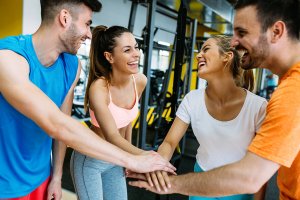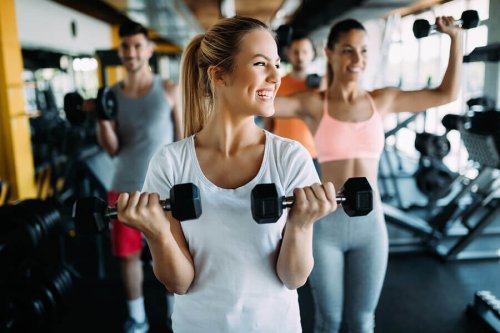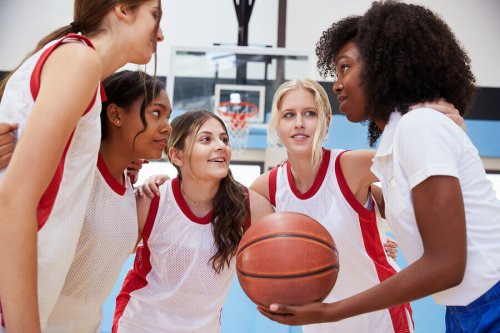How Can Teamwork Improve your Physical Performance?

There are very sociable people who like to participate in group events and to always be around others. On the other hand, there are those who prefer individual activities, although it doesn’t mean they don’t like to be accompanied. Teamwork can improve physical performance, but what are the other advantages of opting for teamwork?
Regardless of the type of personality that you identify with the most, teamwork can improve your physical performance in many ways. Up next, we’ll explain how and why it’s a great option to grow as an athlete.
Teamwork can improve physical performance and motivation
For an athlete to have optimal performance, it’s necessary to have a high level of motivation. Motivation in sports serves as a push to advance more and more, which forms a key aspect of performance.
Much of the motivation is within each athlete. However, the people around them have the power to incentivize it. When working as a team, individuals tend to encourage each other in order to reach the goal together.
This is why teamwork can improve physical performance in an incredible way if they strengthen the bonds within their sports group. That way, they can encourage each other for better individual and collective results.

Mutual support
One of the basic psychological needs of human beings is to feel supported by the people who are part of their circle. Third-party support stimulates security, which in turn, improves performance in different areas.
Within the sports world, feeling support from a team increases the desire to do a good job; therefore, it improves sports performance. Moreover, not only do we gain support at a sports level, but at a personal level as well.
The pressure to improve performance
When you’re part of a sports team, individual physical performance becomes very significant. This is because a fraction of that performance has an impact on the results of that consolidated sports team.
This means that if one of the members isn’t on the same level as the rest, they’ll consider this member as a weak point within the group. This doesn’t mean that the fellowship or support is less; on the contrary, the team will surely make an effort to help that team member improve.
By doing this, the desire to meet the expectations of the team works as an impulse to improve physical performance at an individual level. Thus, the improvement will be reflected in the group performance.
Teamwork can improve physical performance and advance positions
Each member of a team has both a group and individual sports identity; these elements are important and must be well defined. This means that each athlete can have a different role in the team.
For example, in a soccer team, there are different positions. Each of them complements the other and is key to forming the team. At the same time, there’s a captain who represents his teammates in front of the referees, organizes, and leads the team according to the coach’s orders and personal vision.
Being captain entails having excellent sports performance and a good relationship with the team. Hence, the aspiration of the players that are part of a team is to grow in the sports field until they reach a responsibility as great as being a captain.

In order to advance positions within a sports team, whatever the position or role, it’s imperative to train alone and together to perform more and thus reach the position that you desire.
Better physical performance with teamwork
Playing sports individually can produce many benefits, but teamwork can bring out the best version of a person. Being surrounded by other individuals improves one’s self-esteem, confidence, empathy, and motivation.
Finally, the feeling of having the support of a team and a coach makes the path to achieving your goals much more bearable. Don’t close yourself off to the opportunity to be a better athlete through teamwork!
There are very sociable people who like to participate in group events and to always be around others. On the other hand, there are those who prefer individual activities, although it doesn’t mean they don’t like to be accompanied. Teamwork can improve physical performance, but what are the other advantages of opting for teamwork?
Regardless of the type of personality that you identify with the most, teamwork can improve your physical performance in many ways. Up next, we’ll explain how and why it’s a great option to grow as an athlete.
Teamwork can improve physical performance and motivation
For an athlete to have optimal performance, it’s necessary to have a high level of motivation. Motivation in sports serves as a push to advance more and more, which forms a key aspect of performance.
Much of the motivation is within each athlete. However, the people around them have the power to incentivize it. When working as a team, individuals tend to encourage each other in order to reach the goal together.
This is why teamwork can improve physical performance in an incredible way if they strengthen the bonds within their sports group. That way, they can encourage each other for better individual and collective results.

Mutual support
One of the basic psychological needs of human beings is to feel supported by the people who are part of their circle. Third-party support stimulates security, which in turn, improves performance in different areas.
Within the sports world, feeling support from a team increases the desire to do a good job; therefore, it improves sports performance. Moreover, not only do we gain support at a sports level, but at a personal level as well.
The pressure to improve performance
When you’re part of a sports team, individual physical performance becomes very significant. This is because a fraction of that performance has an impact on the results of that consolidated sports team.
This means that if one of the members isn’t on the same level as the rest, they’ll consider this member as a weak point within the group. This doesn’t mean that the fellowship or support is less; on the contrary, the team will surely make an effort to help that team member improve.
By doing this, the desire to meet the expectations of the team works as an impulse to improve physical performance at an individual level. Thus, the improvement will be reflected in the group performance.
Teamwork can improve physical performance and advance positions
Each member of a team has both a group and individual sports identity; these elements are important and must be well defined. This means that each athlete can have a different role in the team.
For example, in a soccer team, there are different positions. Each of them complements the other and is key to forming the team. At the same time, there’s a captain who represents his teammates in front of the referees, organizes, and leads the team according to the coach’s orders and personal vision.
Being captain entails having excellent sports performance and a good relationship with the team. Hence, the aspiration of the players that are part of a team is to grow in the sports field until they reach a responsibility as great as being a captain.

In order to advance positions within a sports team, whatever the position or role, it’s imperative to train alone and together to perform more and thus reach the position that you desire.
Better physical performance with teamwork
Playing sports individually can produce many benefits, but teamwork can bring out the best version of a person. Being surrounded by other individuals improves one’s self-esteem, confidence, empathy, and motivation.
Finally, the feeling of having the support of a team and a coach makes the path to achieving your goals much more bearable. Don’t close yourself off to the opportunity to be a better athlete through teamwork!
All cited sources were thoroughly reviewed by our team to ensure their quality, reliability, currency, and validity. The bibliography of this article was considered reliable and of academic or scientific accuracy.
- Fin, G., Baretta, E., Moreno-Murcia, J. A., & Nodari Júnior, R. J. (2017). Autonomy support, motivation, satisfaction and physical activity level in physical education class. Universitas Psychologica, 16(4), 1–12. https://doi.org/10.11144/Javeriana.upsy16-4asms
- Cantú-Berrueto, A., Castillo, I., López-Walle, J., Tristán, J., & Balaguer, I. (2016). Estilo interpersonal del entrenador, necesidades psicológicas básicas y motivación: Un estudio en futbolistas universitarios Mexicanos. Revista Iberoamericana de Psicologia Del Ejercicio y El Deporte, 11(2), 263–270.
- Moreno-Murcia, J. A., Conte-Marín, L., & Borges-Silva, F. (2008). Necesidades psicológicas básicas, motivación intrínseca y propensión a la experiencia autotélica en el ejercicio físico. Revista Mexicana de Psicología, 25(2), 305–312. Retrieved from http://www.redalyc.org/articulo.oa?id=243016308010
This text is provided for informational purposes only and does not replace consultation with a professional. If in doubt, consult your specialist.








